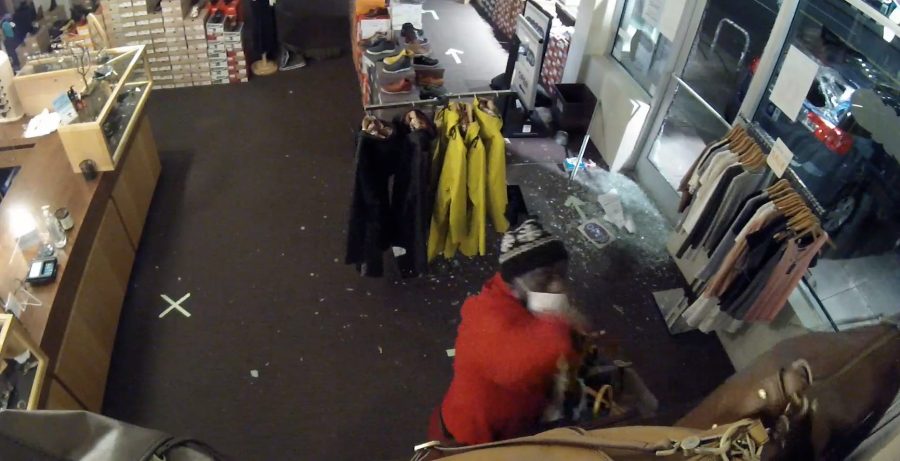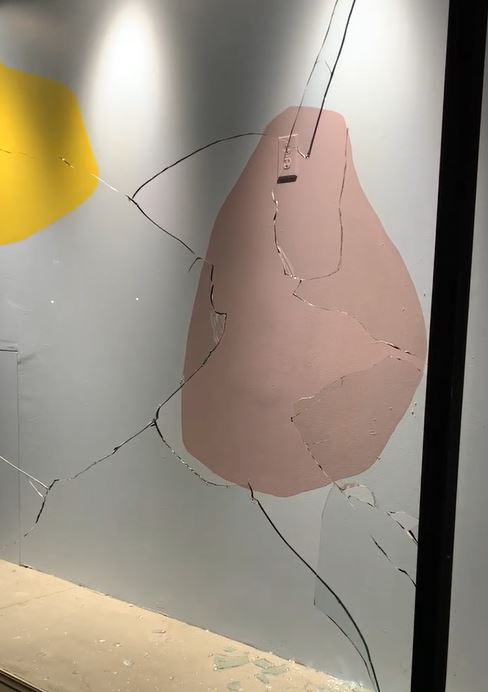PORTLAND, Ore. (KOIN) – Pam Coven has owned shoe stores in Portland for 27 years. In that time, she’s had eight break-ins.
Four of those break-ins occurred in the last 10 months.
“If it’s not COVID-related, I don’t know what it is. If it’s not economically-driven, I don’t know,” said Coven, owner of Imelda’s Shoes and Louie’s Shoes for Men.
2020 delivered obstacle after obstacle to Portland’s small business owners: the COVID-19 shutdown, an economic crisis, protests and riots, wildfire smoke, and a significantly higher number of burglaries compared to recent years.
Coven’s first three burglaries this year occurred at her Northeast Alberta Street store. The fourth was at her Southeast Hawthorne Boulevard location.
In each burglary, she said the police response time was different. With the first couple break-ins, police responded right away. With the third, she said they didn’t show up until the next day. With the fourth burglary, the cops beat her to the store.
The Portland Police Bureau said a burglary is considered a high-priority call if it’s in progress, but officers’ response times have come under scrutiny recently. In mid-November, Portland Mayor Ted Wheeler requested an audit from the police bureau and the 911 Bureau of Emergency Communications on response times.
Sgt. Kevin Allen, a public information officer for the Portland Police Bureau, said there have been times this year when officers could not respond to situations as quickly as they’d like, especially during the protests.
“We certainly feel for the folks that are frustrated by that. We’re frustrated by that and we wish it were different but, we are doing the best we can with the situation that we’re in and we’ll continue to do so,” he said.
From March, when the pandemic began impacting Portland, through November of this year, Portland Police Bureau reported 4,224 burglaries. That’s significantly higher compared to the same time period in 2019 when 3,203 burglaries were reported and in 2018 when 3,272 were reported.

Police don’t have commercial burglaries separated from residential burglaries in their available statistics, but Allen said residential burglaries decreased dramatically early on in the pandemic when more people were staying home.
Both Allen and Portland business owners agree that the decreased foot traffic in shopping districts makes stores more vulnerable to crime.
“Certainly it is easier to commit a crime when there’s no one or few people around to see you do it,” Allen said.
With people working from home and with the lack of tourists this year, some business owners say downtown Portland feels like a ghost town. Stores boarded up their windows to protect them from break-ins and vandalism.
TartBerry, a frozen yogurt shop that’s been open in downtown Portland since 2010, was burglarized in August. Anthony Gross, the shop owner, said someone broke into the building’s garage, found a key to his store, and walked inside. They tore apart his point of sale systems and caused a few thousand dollars in damage.
Gross said he’s grateful the damage wasn’t worse, but during the pandemic, break-ins like these make a big impact when they’re not making a lot of money.
Persevering through the pandemic
The COVID-19 pandemic shutdown and ongoing restrictions have devastated TartBerry.
“I really believed that the whole COVID situation was going to improve with the summer, but it never happened. We got worse,” Gross said.
TartBerry typically allows customers to sample yogurts and scoop their own toppings. When the health department closed buffets, TartBerry had to close too.
Gross and his wife tried to adapt to the situation and offer takeout yogurt, but they only saw about 5-10% of their normal business. They closed their business from Nov. 2 through Jan. 14, since frozen yogurt isn’t as popular during the colder months. They’re hoping things will pick up again when they reopen.
“We want to try and keep it there if we can,” Gross said, “but if things don’t improve, next year, next spring, I can’t, I probably can’t keep it open forever.”
Five blocks away from TartBerry, The Fossil Cartel, a store for crystals, fossils, and gems, has stayed open for the most part throughout the pandemic. Store owner Susan Landa said she boarded up the shop in late May when the protests over the death of George Floyd, a Black man who died after a white police officer kneeled on his neck for several minutes, started in Portland.
She reopened the store to the public on Aug. 14.
Unlike TartBerry, Landa said her sales haven’t been impacted as much. Her sales have been down about 20% in 2020.
“I’m really lucky because most of my business, I’m a destination-oriented business, so most of our customers come in because they looked us up or they already are customers and they know we’re there. I’m so grateful,” she said.
Landa said the number of break-ins occurring during the pandemic are unnerving. That’s why she’s decided to keep the boards up over her windows. She said she plans to keep them up indefinitely, probably until the pandemic is over.
Protests and vandalism create another hurdle
Landa isn’t alone. Many downtown Portland businesses remain boarded up in December, months after the protests began and have mostly subsided. Some of the boards are decorated with murals, others are coated in graffiti.

Kristin Van Buskirk owns Woonwinkel, a home goods and gift store in downtown Portland. She kept boards over her store’s windows for most of the summer. It wasn’t long after she took them down when one of her store windows was smashed in a protest on Nov. 4.
“What happened… with the protest was just one layer of many, many layers that are working against us and it felt frustrating,” Van Buskirk said, “but just like so many of the other things that have been working against us this year, it was just one of many layers.”
These layers – the crime, low foot traffic, and protests – are some of the reasons why Cathy Zwicker and Torie Nguyen have kept their downtown location of Crafty Wonderland closed. Zwicker said the crime is the main reason they’ve kept the boards up over their store.
The two co-owners laid off their entire staff and have been running their Northeast Alberta Street location on their own. They said they’re constantly talking in circles about when they can reopen the downtown location. They wouldn’t want to open it and keep the boards up, but fear taking the boards down would leave them exposed to vandals or burglars.
“We’re already financially burdened. It would just be an additional burden, even just replacing the windows is just super expensive, not to mention the product that you lose,” Zwicker said.
Vandalism, broken windows, and graffiti are also issues burdening the Portland Police Bureau. Sgt. Allen said it was a huge concern during the ongoing protests. With spray paint graffiti, police don’t necessarily want to intervene and enter the crowd to address something that’s relatively easy to clean up.
“That said, you know, we treat vandalism like any other crime and if someone is committing vandalism against a business or anybody from our community, then we will attempt to investigate it,” Allen said.
Even though business owners know the protests resulted in vandalism downtown, both Van Buskirk and Zwicker said they support the demonstrations and feel the anger is justified. It’s just another thing they’ve had to adapt to in the middle of a pandemic.
“I don’t want the focus of what’s happening to our business downtown to be about the protests, because it really isn’t. I think that gets blamed for a lot of things, but it’s kind of just a perfect storm,” Zwicker said.
Hope for 2021
As business owners reach the end of an extremely difficult year, many retailers are anxiously waiting to see how their holiday sales fared. Van Buskirk said she was hoping her business would get at least 70% of its holiday sales compared to 2019 in order to squeak by.
However, the hardship doesn’t stop after the holidays. Andrew Hoan, president and CEO of Portland Business Alliance, said small businesses are the backbone of Oregon’s economy and could be reeling for years after the economic crisis caused by the pandemic.
“Right now they need our support and that support means frequenting those stores when appropriate and how appropriate, but also by respecting them and respecting the business community and making sure that we send a message that we are open and welcoming and that it is safe,” Hoan said.
Business owners who spoke with KOIN 6 News said they hope the change in presidential administration will bring some peace to the city. They said they’re already seeing change after the election.
“Because of the results of the election, people are so jubilant and joyous and I feel like it’s just going to lift the energy of this city,” said Landa, owner of The Fossil Cartel. “I think it’s going to change the outlook of everything.”
Despite these recent promising signs, local businesses still don’t know if they can make it much longer. Some, like Coven who owns the shoe stores, see it as a challenge to make it past the hurdles.
“I have to have faith. I see it as a personal challenge in many ways to get on the other side of this and still be around,” she said.